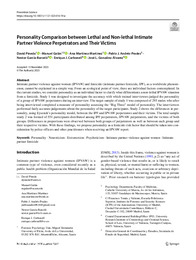Título :
Personality Comparison between Lethal and Non-lethal Intimate Partner Violence Perpetrators and Their Victims |
Autor :
Pineda, David
Galán Morillo, Manuel
Martínez-Martínez, Ana
Andrés‑Prades, Pablo J.
García-Barceló, Néstor
Carbonell, Enrique José
González‑Álvarez, José L. |
Editor :
Springer |
Departamento:
Departamentos de la UMH::Psicología de la Salud |
Fecha de publicación:
2024 |
URI :
https://hdl.handle.net/11000/38342 |
Resumen :
Intimate partner violence against women (IPVAW) and femicide (intimate partner femicide, IPF), as a worldwide phenomenon, cannot be explained in a simple way. From an ecological point of view, there are individual factors contemplated. In the current studies, we consider personality as an individual factor to clarify what differentiates a non-lethal IPVAW situation from a femicide. Study 1 was designed to investigate the accuracy with which trained interviewers judged the personality of a group of IPVAW perpetrators during an interview. The target sample of study 1 was composed of 293 males who after being interviewed completed a measure of personality assessing the “Big Three” model of personality. The interviewers performed fairly accurate judgements about the personality of the target participants. Study 2 shows the differences in personality, using Eysenck’s personality model, between the IPF and IPVAW perpetrators and their victims. The total sample study 2 was formed of 551 participants distributed among IPF perpetrators, IPVAW perpetrators, and the victims of both groups. Differences in proportions were observed between both groups of perpetrators as well as between each group and their respective victims. With these findings, we propose personality as a femicide risk factor that should be taken into consideration by police officers and other practitioners when receiving an IPVAW report.
|
Palabras clave/Materias:
Personality
Neuroticism
Extraversion
Psychoticism
Intimate partner violence against women
Intimate partner femicide |
Área de conocimiento :
CDU: Filosofía y psicología: Psicología |
Tipo de documento :
info:eu-repo/semantics/article |
Derechos de acceso:
info:eu-repo/semantics/openAccess
Attribution-NonCommercial-NoDerivatives 4.0 Internacional |
DOI :
https://doi.org/10.1007/s11121-023-01619-w |
Publicado en:
Prevention Science |
Aparece en las colecciones:
Artículos- Psicología de la Salud
|
 La licencia se describe como: Atribución-NonComercial-NoDerivada 4.0 Internacional.
La licencia se describe como: Atribución-NonComercial-NoDerivada 4.0 Internacional.
.png)
